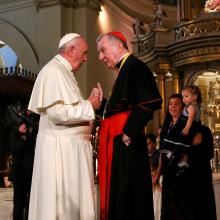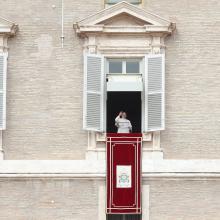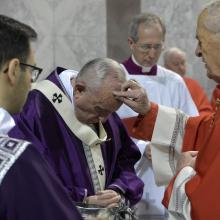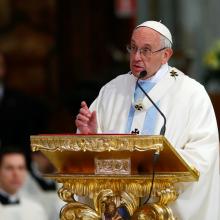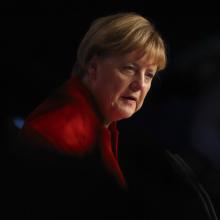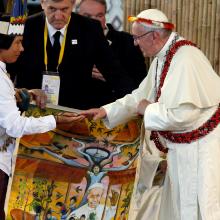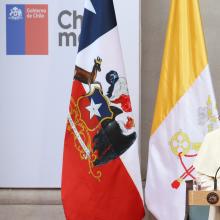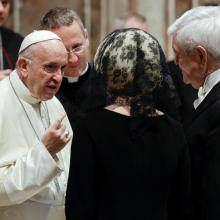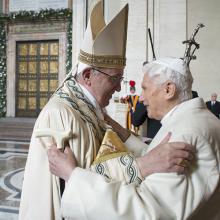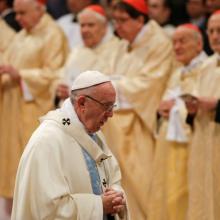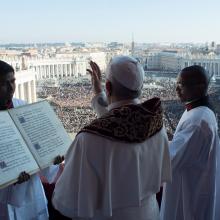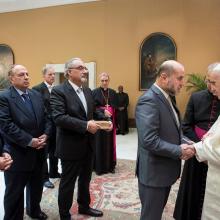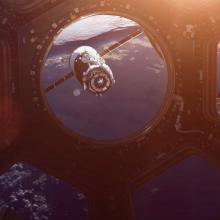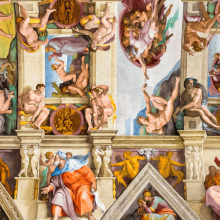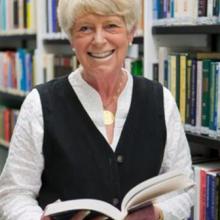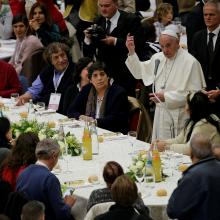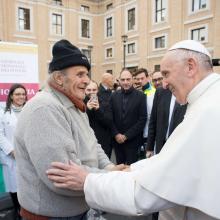Pope Francis

"The Holy See has to work in whatever conditions arise. We can't [always] have the society that we would like to have, or the conditions that we would like to have," he told the Catholic news agency SIR.
Pope Francis on Sunday said Syria was being "martyred" by continued attacks killing civilians in the eastern Ghouta district, calling for an immediate end to violence and access to humanitarian aid.
Pope Francis, leading Catholics into the season of Lent, urged people on Wednesday to slow down amid the noise, haste, and desire for instant gratification in a high-tech world to rediscover the power of silence.
Barros has been accused of protecting his former mentor, the Rev. Fernando Karadima, who was found guilty in a Vatican investigation in 2011 of abusing teenage boys over many years.
“Dog, cats, and motorcycles get blessings, but we’re not worth one?” Mayor Peter Hinze complained. “It can hardly be made clearer that we’re second-class people.”
Pope Francis on Wednesday condemned the "evil" of fake news, saying journalists and social media users should shun and unmask manipulative "snake tactics" that foment division to serve political and economic interests.
"The native Amazonian peoples have probably never been so threatened on their own lands as they are at present," the pope told a crowd of indigenous people from more than 20 groups including the Harakbut, Esse-ejas, Shipibos, Ashaninkas, and Juni Kuin.
Pope Francis publicly expressed "pain and shame" on Tuesday over the rape and molestation of children by priests in Chile and later listened, prayed, and cried at a private meeting with victims.
"Nuclear weapons must be banned," Francis said, quoting a document issued by Pope John XXIII at the height of the Cold War and adding that there is "no denying that the conflagration could be started by some chance and unforeseen circumstance".
The pope spoke of “faithful creativity” in responding to a rapidly changing world. The job of a theologian is to show people what lies at the heart of the Gospel.
Pope Francis described migrants and refugees as the world's "weakest and most needy" on Monday, using his traditional New Year's address to "give voice" to people he has urged leaders to do more to help.
Francis, leader of the world's 1.2 billion Roman Catholics, urged people to see the defenseless baby Jesus in the children who suffer the most from war, migration, and natural calamities caused by man today.
In response to Trump's announcement, patriarchs and heads of all churches in Jerusalem urged Trump to reconsider his decision to relocate the U.S. embassy from Tel Aviv to Jerusalem, reiterating deep concerns of potentially escalating conflicts in a region sacred to Muslims, Jews, and Christians.
Pope Francis reaches to the margins. He’s washed the feet of prisoners and homeless families. Like his Assisi namesake, he’s hugged contemporary “lepers” and made common cause with garbage collectors. But I was still surprised when the pope made a 20-minute video call to the International Space Station in orbit 200 miles above the Earth.
Pope Francis wasn’t the first pontiff to make that long-distance call—his predecessor did that in 2011. But tracking stars and gazing into the heavens have been part of Judeo-Christian tradition since God asked whether Job could “bind the cluster of the Pleiades or loose the belt of Orion” (38:31) some 3,500 years ago. Despite that unfortunate Galileo kerfuffle in the 1600s over the “heresy” of believing that the Earth revolved around the sun, the Vatican has operated state-of the art telescopes since 1582.
As an enthralled 5-year-old, I made a scrapbook about the Apollo 11 spaceflight that placed the first humans on the moon. As an 18-year-old, I marveled at the elegance of physics formulas that served equally well for measuring distances in cells and solar systems. At 54, I laughed out loud when I recognized Fibonacci’s sequence in the passionflower we planted in the back alley. “The universe as a whole, in all its manifold relationships, shows forth the inexhaustible riches of God,” wrote Pope Francis.
AMONG THE MANY hopeful initiatives to come from the Vatican under Pope Francis is an attempt to rebuild the church’s relationship with the arts. Francis declared this to be among his priorities in his famous 2013 interview with Jesuit priest Antonio Spadaro (published in the U.S. by the journal America). Francis listed among his inspirations painters Caravaggio and Chagall, the Russian novelist Dostoevsky and the German poet Friedrich Hölderlin, the music of Bach and Mozart, and the films of Fellini and Rossellini.
Lately the pope’s passion for art has taken tangible form with an interview-based book in Italian, whose title translates to My Idea of Art, and a documentary film of the same name, subtitled in six languages, that tours the Vatican Museum’s artistic treasures. In the book, Pope Francis argues that great art can serve as an antidote to contemporary greed, exclusion, and waste and maintains that “a work of art is the strongest evidence that incarnation is possible.”
Pope Francis came to office determined to downgrade some of the papacy’s pomp and splendor. He lives in a guest house instead of the papal apartment. He wears sturdy black walking shoes instead of those iconic red slippers and a silver cross where his predecessors went for the gold. He seems like the sort who might auction off the Vatican’s art collection and give the money to the poor.
But Francis instead sees the church’s involvement with the arts, past and present, as an occasion for evangelization.
Victims of trafficking get 45 days of what the government calls “recovery and reflection,” and care is offered via the Salvation Army. But traumatized, destitute people need far more than help for just six weeks, Archer discovered. This is where her parish came in.
Francis celebrated a Mass marking the Roman Catholic Church's first yearly World Day of the Poor, which the pope established to draw the attention of the world's 1.2 billion Catholics to the neediest.
Francis did not mention any countries. Healthcare is a big issue in the United States, where President Donald Trump has vowed to get rid of the Affordable Care Act, introduced by his predecessor, Barack Obama, which aimed to make it easier for lower-income households to get health insurance.
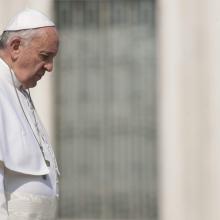
Image via giulio napolitano/Shutterstock
This is where most of us Catholic citizens appear to be, by paying our taxes and going about our lives while our government and our military continue to possess and rely on nuclear weapons. Our Church seems to challenge that we have proportionate reason to do so. For now, we appear to be morally culpable — but less so if we genuinely begin to work toward the elimination of nuclear weapons.
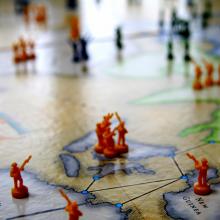
Image via sputnik/Flickr
This is why those Catholics and other Christians who hold that armed force may sometimes be morally justifiable (i.e., just war theory) tend to be "nuclear pacifists” — nuclear war would probably be total war, violating just war principles such as noncombatant immunity and proportionality. And a "first use" to prevent an attack that is not both imminent and grave raises even more red flags.
